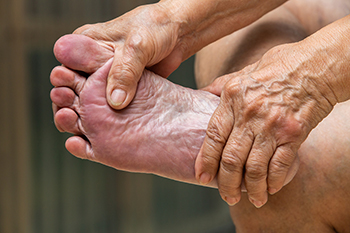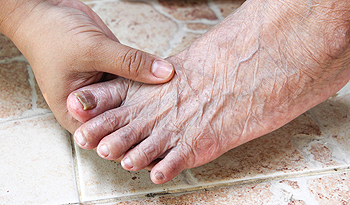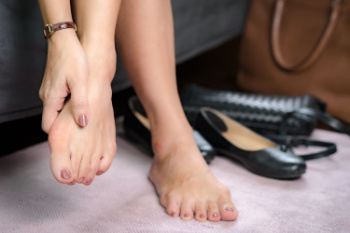Connect With Us
Blog

As the body ages, the fat pads on the feet undergo structural and functional changes that can affect comfort and mobility. Fat pad atrophy, a gradual thinning of the cushioning beneath the heel and forefoot, reduces shock absorption and increases sensitivity to pressure. The loss of elasticity in the skin and connective tissues further contributes to discomfort, making the feet more vulnerable to pain and injuries. Altered biomechanics, including changes in gait and posture, may develop as the body compensates for reduced cushioning. Increased pressure points can lead to calluses, soreness, and a higher risk of foot conditions. If you are elderly and have foot pain, it is suggested that you schedule an appointment with a podiatrist who can offer you effective relief methods.
If you need your feet checked, contact Thomas Bobrowski, DPM of InStride Crystal Coast Podiatry. Our doctor will attend to all of your foot and ankle needs and provide you with quality treatment.
Geriatrics and Podiatry
When people age, some common issues that may occur are bone density loss, dry skin, poor circulation, and rough brittle nails. These issues may also affect your foot health if the necessary steps are not taken to alleviate the problems.
It is important to take care of your feet because feet that are injured or diseased can affect your overall health. Having painful feet hinders your ability to do daily activities or may decrease your willingness to do the things that you need to do.
Visiting Your Geriatrician
As we age, health problems become more likely, so it is essential to visit your doctor for check-ups to ensure that you are doing the best you can to take care of your health. It is recommended to check your feet frequently for any possible cuts, bruises, swelling, corns or any other irregularities.
Taking Care of Elderly Feet
Cracked or dry feet can be treated by applying moisturizer often. It is also important not to wear old socks because the older the sock is, the higher the possibility there will be that there is bacteria there. Wear fresh socks and make sure they fit properly.
Proper foot health means that you can have a more active lifestyle and you will not be bogged down by pain. Foot health also leads to good circulation, which is paramount for overall health.
If you have any questions, please feel free to contact our office located in New Bern, NC . We offer the newest diagnostic tools and technology to treat your foot and ankle needs.

Toenail fungus infections occur when fungi enter the body through small cracks in the nail, gaps between the nail and toe, or tiny cuts in the surrounding skin. People who frequently walk barefoot in damp places like gym locker rooms, pool decks, and public shower areas are at a higher risk, as fungi thrive in warm, moist environments. Wearing tight, closed-toe shoes, especially with sweaty socks, can also create the perfect conditions for fungal growth. Certain health conditions, including diabetes, poor circulation, and a weakened immune system, may make infections more likely. Those individuals with a history of athlete’s foot or previous nail infections are also at an increased risk. A fungal toenail infection may cause the toenail to thicken, become brittle, or change color over time. A podiatrist can confirm the infection and recommend treatment, which may include topical antifungal medication, debridement, laser therapy, or surgery, for severe cases. If you believe you have been infected by a toenail fungus, it is suggested that you schedule an appointment with a podiatrist for an exam, diagnosis, and treatment options.
For more information about treatment, contact Thomas Bobrowski, DPM of InStride Crystal Coast Podiatry. Our doctor can provide the care you need to keep you pain-free and on your feet.
Toenail Fungus Treatment
Toenail fungus is a condition that affects many people and can be especially hard to get rid of. Fortunately, there are several methods to go about treating and avoiding it.
Antifungals & Deterrence
Oral antifungal medicine has been shown to be effective in many cases. It is important to consult with a podiatrist to determine the proper regiment for you, or potentially explore other options.
Applying foot powder on the feet and shoes helps keep the feet free of moisture and sweat.
Sandals or open toed shoes – Wearing these will allow air movement and help keep feet dry. They also expose your feet to light, which fungus cannot tolerate. Socks with moisture wicking material also help as well.
If you have any questions please feel free to contact our office located in New Bern, NC . We offer the newest diagnostic tools and technology to treat your foot and ankle needs.

A bunion is a bony bump that forms at the base of the big toe when the joint becomes misaligned. This condition develops gradually as the big toe shifts toward the smaller toes, causing inflammation, discomfort, and difficulty wearing certain shoes. High heels do not directly cause bunions, but they can contribute to their development by placing excessive pressure on the front of the foot. Shoes with a narrow toe box force the toes into an unnatural position, increasing strain on the joint. People with a genetic predisposition or preexisting foot conditions are more likely to develop bunions when wearing high heels frequently. If you have a bunion, it is suggested that you consult a podiatrist who can offer you appropriate treatment solutions, and guide you on what type of shoes to wear to prevent bunions.
If you are suffering from bunions, contact Thomas Bobrowski, DPM of InStride Crystal Coast Podiatry. Our doctor can provide the care you need to keep you pain-free and on your feet.
What Is a Bunion?
A bunion is formed of swollen tissue or an enlargement of boney growth, usually located at the base joint of the toe that connects to the foot. The swelling occurs due to the bones in the big toe shifting inward, which impacts the other toes of the foot. This causes the area around the base of the big toe to become inflamed and painful.
Why Do Bunions Form?
Genetics – Susceptibility to bunions are often hereditary
Stress on the feet – Poorly fitted and uncomfortable footwear that places stress on feet, such as heels, can worsen existing bunions
How Are Bunions Diagnosed?
Doctors often perform two tests – blood tests and x-rays – when trying to diagnose bunions, especially in the early stages of development. Blood tests help determine if the foot pain is being caused by something else, such as arthritis, while x-rays provide a clear picture of your bone structure to your doctor.
How Are Bunions Treated?
- Refrain from wearing heels or similar shoes that cause discomfort
- Select wider shoes that can provide more comfort and reduce pain
- Anti-inflammatory and pain management drugs
- Orthotics or foot inserts
- Surgery
If you have any questions, please feel free to contact our office located in New Bern, NC . We offer the newest diagnostic and treatment technologies for all your foot care needs.

